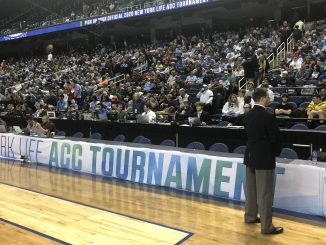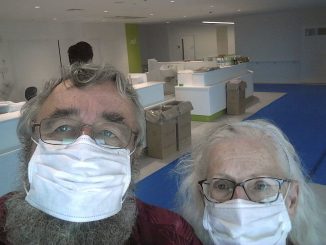
 After President Trump addressed the nation last Wednesday and all college basketball tournaments were canceled, America suddenly woke up on the issue of the coronavirus.
After President Trump addressed the nation last Wednesday and all college basketball tournaments were canceled, America suddenly woke up on the issue of the coronavirus.
Then came the announcements of public school closures in several states, including North Carolina. Some governors have even moved to close down restaurants and bars, allowing them to stay open only for delivery and pick up orders.
The reason they’ve done the latter is because there are still a lot of people who are not practicing “social distancing” — where you stand at least six feet apart from the nearest person, or otherwise try to avoid crowded areas.
As proof, photos and videos circulated on social media over the weekend of people in bars and restaurants, pressed close to each other. Any other time, that would be nothing out of the norm for your average weekend.
But for a country concerned that people who aren’t taking this threat seriously are going to eventually cause the healthcare system to be overwhelmed with coronavirus cases, it was alarming, not something they wanted to see.
In October 2009 during the H1N1 pandemic, I was diagnosed with the swine flu. I was not prepared for the diagnosis, and wondered if I’d be able to recover. I’d read stories about people who had died from it. The PA assured me that because we had caught it early on that it was treatable.
She was right in my case; thank God. I was able to beat the swine flu with Tamiflu, inhalers, lots of chicken soup, and some TLC from my mom and dad, who refused to let me fight it alone. I stayed at their house for the remainder of the time I had the swine flu, terrified I’d give it to them. Fortunately, I didn’t.
But it was a really tough battle. It took almost everything out of me to get through it. It was different than anything I’d ever been through.
I had it for about two weeks. The recovery time for it almost seemed worse. It took me about a month to fully get over it. There were days I’d come home from work flat out exhausted. I’d get on the couch and sleep as soon as I walked in the door. No dinner, no changing clothes, no nothing.
It changed me. I became fanatical about washing my hands and using hand sanitizer. When we had guests visit the office, I was the one who typically greeted them. I kept hand sanitizer in the reception area and would ask people to use it before they met with whoever they were there to see.
I wasn’t sure if I could get it again, but I wasn’t going to take any chances. I didn’t want my colleagues to go through what I did either. No one else in the office got it but me, and I’d like to think that it maybe had a little something to do with my emphasis on hand wipes and hand washing and my reminders to people to stand several feet away from each other.
Here we are now, and I’m feeling a bit of deja vu.
Naturally, I’m worried I could come down with it. Even more concerning, I have two senior citizen parents who are at a higher risk for becoming infected. My dad also has underlying conditions that make him especially susceptible. So I’m very concerned for them, considering those most likely to die from the coronavirus are the elderly.
Because of what I went through in 2009, because of my parents’ situation, and because I care about what happens to my neighbors and my community, I’m heeding the CDC’s warnings about social distancing, hand washing, and not touching my face.
I pray more people will do the same.
Stacey Matthews has also written under the pseudonym Sister Toldjah and is a regular contributor to RedState and Legal Insurrection.



